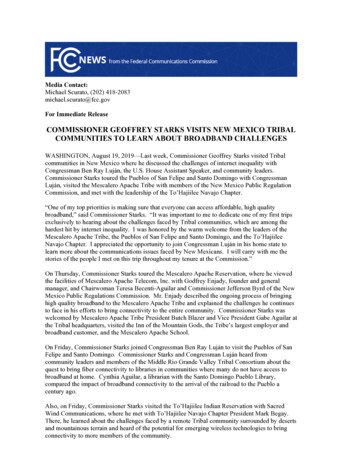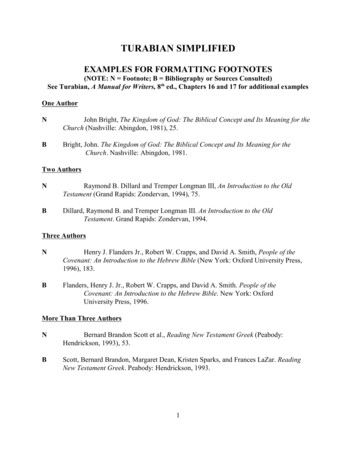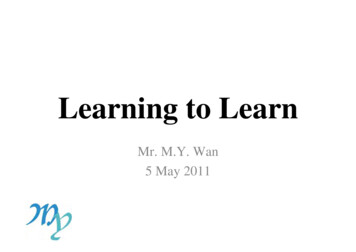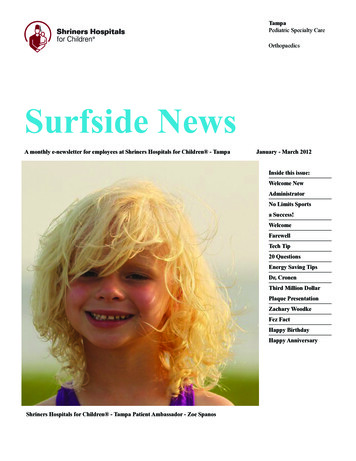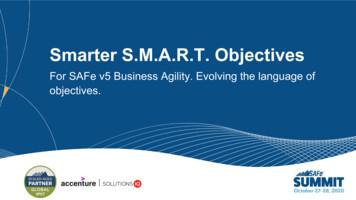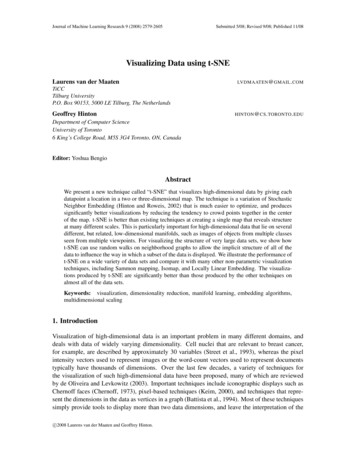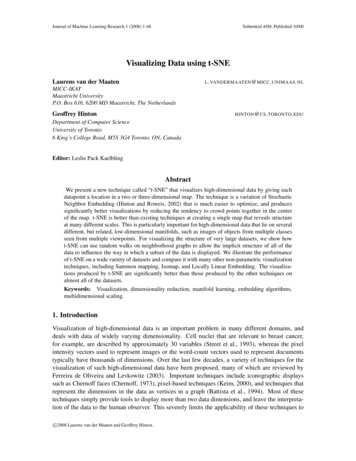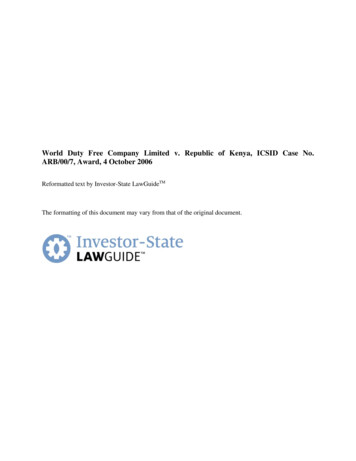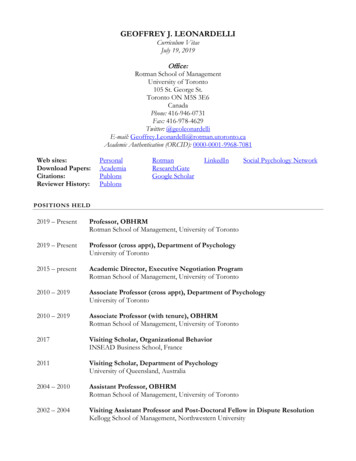
Transcription
GEOFFREY J. LEONARDELLICurriculum VitaeJuly 19, 2019Office:Rotman School of ManagementUniversity of Toronto105 St. George St.Toronto ON M5S 3E6CanadaPhone: 416-946-0731Fax: 416-978-4629Twitter: @geoleonardelliE-mail: Geoffrey.Leonardelli@rotman.utoronto.caAcademic Authentication (ORCID): 0000-0001-9968-7081Web sites:Download Papers:Citations:Reviewer chGateGoogle ScholarLinkedInSocial Psychology NetworkPOSITIONS HELD2019 – PresentProfessor, OBHRMRotman School of Management, University of Toronto2019 – PresentProfessor (cross appt), Department of PsychologyUniversity of Toronto2015 – presentAcademic Director, Executive Negotiation ProgramRotman School of Management, University of Toronto2010 – 2019Associate Professor (cross appt), Department of PsychologyUniversity of Toronto2010 – 2019Associate Professor (with tenure), OBHRMRotman School of Management, University of Toronto2017Visiting Scholar, Organizational BehaviorINSEAD Business School, France2011Visiting Scholar, Department of PsychologyUniversity of Queensland, Australia2004 – 2010Assistant Professor, OBHRMRotman School of Management, University of Toronto2002 – 2004Visiting Assistant Professor and Post-Doctoral Fellow in Dispute ResolutionKellogg School of Management, Northwestern University
Geoffrey J. Leonardelli Curriculum Vitae2002Page 2 of 22July 19, 2019Lecturer, Department of PsychologyUniversity of MarylandEDUCATIONPh.D.The Ohio State University, Columbus, Social Psychology, June 2002Minor Fields: Quantitative Methods and Cognitive PsychologyThesis: Smaller can be better: Minority affirmation in intergroup relationsCommittee: Marilynn Brewer (Advisor), Robert Arkin, Richard Petty, Lisa FloresM.A.The Ohio State University, Columbus, Social Psychology, August 1998Thesis: The motivational underpinnings of social discriminationCommittee: Marilynn Brewer (Advisor), Robert Arkin, Philip TetlockB.AUniversity of North Carolina, Chapel Hill, August 1995Major: Psychology with honors and distinctionThesis: State self-esteem: Self-concept confusion or self-concept positivity?Committee: Constantine Sedikides (Advisor), John Schopler, Vaida ThompsonAWARDS20192015-present2014Roger Martin Excellence in Teaching Award (awarded to one or two faculty in the Rotman Schoolof Management per year; based on teaching accomplishments over the last 3 years)Excellence in Teaching Award, MBAs, average 6.62/7Certificate of Reviewing Excellence, Journal of Experimental Social Psychology2009 – 2013Excellence in Teaching Award, MBAs, average(last 5 years) 6.49/7.0. Received award becauseaverage teaching ratings were above threshold (6.0/7)2005 - 2006Excellence in Teaching Award, undergraduates, average(overall) 6.54/7.0; details in “TeachingExperience”; Rotman School of Management, University of Toronto2009Membership Invitation, Society for Experimental Social Psychology2006Best Paper Proceeding, GDO Division, Academy of Management conference2004Best Paper Proceeding, Conflict Management Division, Academy of Management conference2002-2004Post-Doctoral Fellowship, Dispute Resolution Research Center, Kellogg School of Management,Northwestern University2001-2002Presidential Fellowship for Distinguished Dissertation Proposal, The Ohio State University2001Travel Award, “Implicit theories of intelligence shape self-evaluations of intellectual ability”, Society forPersonality and Social Psychology1998Finalist for the Edward F. Hayes Graduate Research Forum, The Ohio State University
Geoffrey J. Leonardelli Curriculum Vitae1995GRANTSPage 3 of 22July 19, 2019Honorable Mention for Dashiell-Thurstone Award (best honors thesis), University of North Carolina2018 - 2019Grant, “Think-Leader-Think-Women: People Turn to Women Leaders for Teams with Hidden Goals” 6500 (Lead applicant: Jing Hu), Institute for Gender the Economy, Rotman School ofManagement2015 - 2020Insight Grant, “Three Kinds of Self-Categorization” 150,366 (Co-applicant: Soo Min Toh), SocialSciences and Humanities Research Council of Canada2015University of Toronto Excellence Award (UTEA), “Space Organizing and Mindfulness,” 6000(undergraduate research funding for Suraiya Allidina)2010 – 2014Standard Research Grant, “Fair Treatment from Authorities and Intergroup Aid,” 81,258(Collaborator: Soo Min Toh), Social Sciences and Humanities Research Council of Canada2013University of Toronto Excellence Award (UTEA), “Height and Leader Emergence,” 5625(undergraduate research funding for Ravin Alaei)2009 – 2010AIC Institute, “Moral identity and self-affirmation in ethical decision-making,” 10,000 (w/Jun Gu),J.L. Rotman School of Management, University of Toronto2006 – 2010Standard Research Grant, Optimal Distinctiveness and Intra-Group Cooperation, 101,941(Collaborator: Marilynn Brewer), Social Sciences and Humanities Research Council of Canada2006 – 2008AIC Institute, “Regulatory Focus and Citizenship Behaviors,” 10,000, (with Jun Gu), J.L. RotmanSchool of Management, University of Toronto2003Kellogg Teams and Groups, titled “Optimal Distinctiveness and Nested Groups”, Northwestern Univ.2003Dispute Resolution Research Center, “Optimal Distinctiveness in Prisoner’s Dilemma”, NorthwesternUniv.2003Dispute Resolution Research Center, “Self-Handicapping in Negotiations”, Northwestern University2001 - 20021995Alumni Research Award, “Optimal Distinctiveness and Group Preference”, The Ohio State UniversityHarriet L. Rheingold Undergraduate Research Grant, University of North CarolinaRESEARCH INTERESTS & SUMMARYSelf and identity; group processes, social identity, optimal distinctiveness, intergroup relations; diversity,social justice; inspiration and talent; negotiations, social decision-making and conflictFunding Awarded Grants Awarded: at least 10 Funding Awarded: over 371,000Presentation Contributions Invited talks: 3 Invited university colloquia: 34
Geoffrey J. Leonardelli Curriculum Vitae Funding for Training: over 190,000Training Contributions Undergraduates supervised: 30 Undergraduate research projects: 8 Grad. students trained (Master’s & PhD): 10 Dissertation committees: 7 Doctoral degrees supervised: 1 Conference presentations: 49Page 4 of 22July 19, 2019Writing Contributions Edited Book: 1 Publications, peer reviewed: 20 Publications, practitioner: 8 Book chapters/other publications: 7 Cases/Exercises: 2 Papers under review/in progress: 7PROFESSIONAL ACTIVITIESBooks1. Kramer, R.M., Leonardelli, G.J., & Livingston, R.W. (2011). Social Cognition, SocialIdentity, and Intergroup Relations: A Festschrift in Honor of Marilynn Brewer. Psychology PressFestschrift series. New York, NY: Taylor & Francis. Reviewed in Administrative ScienceQuarterly (Phillips, 2012). LinkPublications:Peer Reviewed2. Leonardelli, G.J., *Gu, J., *McRuer, G., Medvec, V., & Galinsky, A.D. (2019).Multiple equivalent simultaneous offers (MESOs) reduce the negotiator dilemma: How(most recent 1st)a choice of first offers increases economic and relational outcomes. OrganizationalBehavior and Human Decision Processes, 152, 64-82. DOI: 10.1016/j.obhdp.2019.01.007Open Access Paper. Supplementary materials. Data.*current/formerstudent or post- 3. La Macchia, S. T., Louis, W. R., Hornsey, M. J., & Leonardelli, G. J. (2016). In smalldoctoral fellowwe trust: Lay theories about small and large groups. Personality and Social PsychologyBulletin, 42(10), 1321-1334. doi:10.1177/0146167216657360 Paper.4. Leonardelli, G.J., & Loyd, D.L. (2016). Optimal distinctiveness signals membershiptrust. Personality and Social Psychology Bulletin, 42(7), 843-854, DOI:10.1177/0146167216643934 Paper.5. Leonardelli, G.J. & Toh, S.M. (2015). Social categorization in intergroup contexts:Three kinds of self-categorization. Social and Personality Psychology Compass, 9(2), 69–87,DOI: 10.1111/spc3.12150 Paper.6. Cohen, T. R., Leonardelli, G. J., & Thompson, L. L. (2014). Avoiding the agreementtrap: Teams facilitate impasse in negotiations with negative bargaining zones.Negotiation and Conflict Management Research, 7(4), 232-242, DOI: 10.1111/ncmr.12038Paper.7. Toh, S. M., & Leonardelli, G. J. (2013). How global leaders can promote women indifferent cultures. Organizational Dynamics, 42(3), 191-197. DOI:10.1016/j.orgdyn.2013.06.004 Paper.8. *Gu, J., *Bohns, V., & Leonardelli, G.J. (2013). Regulatory focus and interdependenteconomic decision-making. Journal of Experimental Social Psychology, 49(4), 692–698, DOI:10.1016/j.jesp.2012.11.008 Paper.
Geoffrey J. Leonardelli Curriculum VitaePage 5 of 22July 19, 20199. Toh, S.M., & Leonardelli, G.J. (2012). Cultural constraints on the emergence ofwomen as leaders. Journal of World Business, 47, 604-611. DOI:10.1016/j.jwb.2012.01.013 Paper.10. Leonardelli, G.J., & Toh, S.M. (2011). Perceiving expatriate coworkers as foreignersencourages aid: Social categorization and procedural justice together improveintergroup cooperation and dual identity. Psychological Science, 22(1), 110–117. DOI:10.1177/0956797610391913. Authors contributed equally. Paper.11. Leonardelli, G.J., Pickett, C.L., & Brewer, M.B. (2010). Optimal distinctivenesstheory: A framework for social identity, social cognition and intergroup relations. InM. Zanna & J. Olson (Eds.) Advances in experimental social psychology (Vol. 43, pp. 65-115).New York: Elsevier. Paper.12. Zhong, C.B., & Leonardelli, G.J. (2008). Cold and lonely: Does social exclusionliterally feel cold? Psychological Science, 19(9), 838-842, DOI: 10.1111/j.14679280.2008.02165.x Paper.13. Rosette, A., Leonardelli, G.J., & Phillips, K.W. (2008). The White standard: Racialbias in leader categorization. Journal of Applied Psychology, 93(4), 758-777. DOI:10.1037/0021-9010.93.4.758 Paper.14. Zhong, C., Phillips, K.W., Leonardelli, G.J., & Galinsky, A. (2008). Negationalcategorization and intergroup behavior. Personality and Social Psychology Bulletin, 34(6),793-806. DOI: 10.1177/1054773804271935 Paper.15. Leonardelli, G.J., Lakin, J.L., & Arkin, R.M. (2007). A regulatory focus model of selfevaluation. Journal of Experimental Social Psychology, 43(6), 1002-1009.DOI: 10.1016/j.jesp.2006.10.021 Paper.16. Galinsky, A.D., Leonardelli, G.J., Okhuysen, G.A., & Mussweiler, T. (2005). The roleof regulatory focus in negotiation: Promoting distributive and integrative success.Personality and Social Psychology Bulletin, 31(8), 1087-1098.DOI: 10.1177/0146167205276429 Paper.17. Leonardelli, G.J., & Tormala, Z.L. (2003). The negative impact of perceivingdiscrimination on collective well-being: The mediating role of perceived ingroup status.European Journal of Social Psychology, 33, 507-514. DOI: 10.1002/ejsp.159 Paper.18. De Cremer, D., & Leonardelli, G.J. (2003). Cooperation in social dilemmas and theneed to belong: The moderating effect of group size. Group Dynamics: Theory, Research,and Practice, 7(2), 168-174. DOI: 10.1037/1089-2699.7.2.168 Paper.19. Leonardelli, G.J., Hermann, A.D., Lynch, M.E., & Arkin, R.M. (2003). The shape ofself-evaluation: Implicit theories of intelligence and judgments of intellectual ability.Journal of Research in Personality, 37, 141-168.DOI: 10.1016/S0092-6566(02)00565-2Paper.
Geoffrey J. Leonardelli Curriculum VitaePage 6 of 22July 19, 201920. Hermann, A.D., Leonardelli, G.J., & Arkin, R.M. (2002). Self-doubt and self-esteem:A threat from within. Personality and Social Psychology Bulletin, 28, 395-408.DOI: 10.1177/0146167202286010 Paper.21. Leonardelli, G.J., & Brewer, M.B. (2001). Minority and majority discrimination:When and why. Journal of Experimental Social Psychology, 37, 468-485.DOI: 10.1006/jesp.2001.1475 Paper.Publications:Practitioner22. Leonardelli, G. J. (2019, April 4). What managers can learn from the TrumpLighthizer memo of (mis)understanding. The Globe and Mail. Link.23. Leonardelli, G. J. (2018). The power of a prospecting mindset in negotiations. RotmanMagazine (Spring), 118-120.24. Kaplan, S., & Leonardelli, G. J. (2016, June 23). Inclusion key to creating safeLGBTQ work space. The Toronto Star. Link.25. Toh, S. M., & Leonardelli, G. J. (2014, July). Strategies to promote women shouldvary across cultures. Harvard Business Review. Link.26. Leonardelli, G.J. & Zhong, C.B. (2010). Negational categorization. Rotman Magazine,Spring, 98-100. Paper.27. Leonardelli, G. J., Galinsky, A.D., Okhuysen, G.A., & Mussweiler, T. (2007).Achieving optimal agreements. Rotman Magazine, Spring, 50-53. Paper.28. Thompson, L.L., & Leonardelli, G.J. (2004). Why negotiation is the most popularbusiness school course. Ivey Business Journal. Link.29. Thompson, L.L., & Leonardelli, G.J. (2004). The Big Bang: The evolution ofnegotiation research. [Article part of special issue on Getting to Yes.] Academy ofManagement: Executive, 18(3), 113-117. Paper.Publications:Chapters30. Leonardelli, G.J., Bohns, V., & Gu, J. (2015). Security seeking in a regulatory focuswhodunit: The case of the relative orientation in behavioral economics. In P.J. Carroll,R.M. Arkin, & A. Wichman (Eds.), The Handbook of Personal Security (pp. 225-240). NewYork, NY, USA: Psychology Press. Paper.31. Tasa, K., Whyte, G., & Leonardelli, G.J. (2013). Goals and negotiation. In E.A.Locke & G.P. Latham (Eds.) New Developments in Goal Setting and Task Performance (pp.397-414). New York, NY, USA: Routledge. Paper.32. Toh, S.M., DeNisi, A.S., & Leonardelli, G.J. (2012). The perspective of host countrynationals in socializing expatriates: The importance of foreign-local relations. In C.Wanberg (Ed.) The Oxford Handbook of Organizational Socialization. New York, NY:Oxford University Press. Paper.
Geoffrey J. Leonardelli Curriculum VitaePage 7 of 22July 19, 201933. Livingston, R.W., Leonardelli, G. J. & Kramer, R.M. (2011). Four pillars ofexcellence: The legacies of Marilynn Brewer’s social psychology. In R.M. Kramer, G.J.Leonardelli, & R.W. Livingston (Eds.), Social Cognition, Social Identity, andIntergroup Relations: A Festschrift in Honor of Marilynn Brewer. Psychology Press Festschriftseries. New York: Taylor & Francis. Paper.34. Leonardelli, G.J., Pickett, C.L., Joseph, J.E., & Hess, Y.D. (2011). Optimaldistinctiveness theory in nested categorization contexts: Moving from duelingidentities to a dual identity. In R.M. Kramer, G.J. Leonardelli, & R.W. Livingston(Eds.), Social Cognition, Social Identity, and Intergroup Relations: A Festschrift in Honor ofMarilynn Brewer (pp. 103-125). Psychology Press Festschrift series. New York: Taylor &Francis. Paper.35. Leonardelli, G.J., & Lakin, J.L. (2010). The new adventures of regulatory focus: Selfuncertainty and the quest for a diagnostic self-evaluation. In R.M. Arkin, K.C. Oleson,P.J. Carroll (Eds.), The Uncertain Self: A Handbook of Perspectives from Social and PersonalityPsychology (pp. 249-265). Mahwah, NJ: Lawrence Erlbaum Associates. Paper.36. Pickett, C. L., & Leonardelli, G.J. (2006). Using collective identities for assimilationand differentiation (pp. 56-73). In T. Postmes & J. Jetten (Eds.), Individuality and theGroup: Advances in Social Identity. Thousand Oaks, CA: Sage Publications. Paper.Manuscriptunder Review:37. Leonardelli, G.J., Toh, S.M., & *Kim, Y.J. (2019). Social categorization increasesintergroup cooperation: A behavioral field experiment.WorkingPapers:38. *Allidina, S., & Leonardelli, G.J. (2019). Categorization leads to greater mindfulness.Paper in preparation. University of Toronto.39. Leonardelli, G.J. (2019). Understanding diversity through the lens of three kinds ofself-categorization. Out for friendly review.40. Leonardelli, G.J., & Whyte, G.R. (2019). How high status harms negotiationoutcomes. Paper in preparation. University of Toronto.*denotes current/former PhD student or post-doctoral fellowWorks inProgress:41. *Hu, J., & Leonardelli, G.J. (2019a). Racial bias in leader categorization: A cross-culturalinvestigation. Data collection in progress. University of Toronto.42. *Hu, J., & Leonardelli, G.J. (2019b).Think-Leader-Think-Women: People turn to womenleaders for teams with hidden goals. Data collection in progress. University of Toronto.43. *Kim, Y.J., Toh, S.M., & Leonardelli, G.J. (2019). Gendered leadership among theUS States: cultural tightness amid transitions. Data collection in progress. University ofToronto.44. Leonardelli, G.J., & Cunningham, W.A. (2019). Theory as method: Improving ourdiscussion of theory in psychological science. Data collection in progress. University ofToronto.
Geoffrey J. Leonardelli Curriculum VitaePage 8 of 22July 19, 201945. Leonardelli, G.J., *Kim, J.H., & *Leblanc, C.A. (2019). Three kinds of self-categorization.Data collection in progress. Univ. of Toronto.46. *Zhao, X., & Leonardelli, G.J. (2019). Three kinds of self-categorization and attitudesabout diversity. Data collection in progress. University of Toronto.*denotes current/former PhD student or post-doctoral fellowCases andExercises(most recent 1st)47. Leonardelli, G.J., Samtani, H., & McRuer, G. (2010). Soccer Solutions. Rotman Schoolof Management, University of Toronto, Canada. A two-party negotiation exercise overa professional soccer player’s contract. Designed to teach distributive and integrativebargaining and multiple equivalent simultaneous offers. Ideal negotiation for testingthe effects of offer equivalence. 15 minutes to prepare, 30 to negotiate.48. Leonardelli, G.J. (2008). The Bancroft Family and the Sale of the Dow Jones Co. RotmanSchool of Management, University of Toronto, Canada. A short case on the sale ofDow Jones Company (owner of the Wall Street Journal) to the News Corp. Discussionfocuses on what the Bancroft family could have done to gain more value from thenegotiation. Great for discussing team dynamics, negotiations, or both and can be usedfor courses on OB, strategy, negotiation and teams. 15 minutes to read, 15 to d Activities:(most recent 1st)Behfar, K.J., Kern, M., Leonardelli, G.J., & Thompson, L.M. (2005). Inter-team conflict in amultiple round negotiation and its impact on outcomes. University of California, Irvine.*see SSRN for a copy:: cfm1. Leonardelli, G.J., Gu, J., & Galinsky, A.D. (July 2019). Multiple equivalent simultaneousoffers reduce the negotiator dilemma: How a choice of first offers increases individual and jointoutcomes. Presenter, International Association for Conflict Management, Dublin, IE.2. Leonardelli, G.J. (2019). Three kinds of self-categorization. Presenter, Groups preconference of the Society for Personality and Social Psychology conference, Portland,OR, USA.3. Leonardelli, G.J. (2018). One lab, many paths: Different career options after your PhD. Panelmember, the Society for Personality and Social Psychology conference, Atlanta, GA,USA.4. Leonardelli, G.J., & Toh, S.M. (2016). Social categorization improves intergroup helping: Abehavioral field experiment. Paper presented at the Academy of Management conference,Anaheim, CA, USA.5. Hu*, J., Leonardelli, G.J., & Toh, S.M. (2016). The white leader prototype in China? A testof cultural exposure and white dominance. Paper presented at the Academy of Managementconference, Anaheim, CA, USA.6. Leonardelli, G.J., *Gu, J., & *McRuer, G. (2016). Multiple Equivalent Simultaneous Offers:Negotiating with a Velvet Hammer. Paper presented at the Society for Personality andSocial Psychology, San Diego, CA.
Geoffrey J. Leonardelli Curriculum VitaePage 9 of 22July 19, 20197. Leonardelli, G.J., & Toh, S.M. (2014). Social categorization improves intergroup cooperation:A behavioral field experiment. Paper presented at the Interdisciplinary Network ofGroups Researchers (INGRoup) conference, Raleigh, NC.8. Toh, S. M., Leonardelli, G., & Ekkirala, S. (2014). Superordinate and subgroupcategorization effects on expatriate information seeking and perceived information sharing from hostcountry nationals. In S. Reiche (chair), “Me, Myself and I: From Individual-Centered toMultiple Stakeholder Perspectives in Expatriate Research.” Symposium to bepresented at the Academy of International Business Annual Meeting, Vancouver,Canada.9. Leonardelli, G.J., & Loyd, D.L. (2013). Optimal distinctiveness signals membership trust.Paper part of P. van Lange (chair) Symposium titled “Psychological and EvolutionaryPerspectives of Trust and Cooperation” at the Society for Experimental SocialPsychology conference, Berkeley, CA, USA.10. Leonardelli, G.J., & Loyd, D.L. (2013). Optimal distinctiveness as a marker of member trust.Poster presented at the Society for Personality and Social Psychology conference,New Orleans, LA.11. Leonardelli, G.J., & Whyte, G.R. (2012). How high status leads to worse negotiated outcomes.To be presented as part of a symposium on counter-intuitive effects in negotiations atthe Academy of Management conference, Boston, MA.12. *McRuer, G., *Gu, J., & Leonardelli, G.J. (2012). Multiple Equivalent Simultaneous Offersin Negotiations: Effects on Individual and Joint Gain. Paper to be presented at the Academyof Management conference, Boston, MA.13. Leonardelli, G.J., Pickett, C.L., *Joseph, J., & *Hess, Y.D. (2011). Optimal distinctivenessin nested categorization contexts: From dueling identities to dual identity. Paper presented aspart of a symposium on social identities at the Society for Experimental SocialPsychology conference, Washington, DC.14. Toh, S.M., & Leonardelli, G.J. (2011). Perceiving expatriates as foreign and fair treatmentencourages information sharing. Presented as part of a symposium on expatriate relationswith host country nationals at the Academy of International Business conference,Nagoya, Japan.15. *Min, J., Leonardelli, G.J., & Toh, S.M. (2011). The origins of the white leadership prototype:The role of exposure to western culture. Presented as part of a symposium on “Asians inOrganizations” at Academy of Management conference, San Antonio, TX.16. Leonardelli, G.J., Pickett, C.L., *Joseph, J., & *Hess, Y.D. (2011). Optimal distinctivenessin nested categorization contexts: From dueling identities to dual identity. Presented as part of asymposium on social identities at the Academy of Management conference, SanAntonio, TX.17. Leonardelli, G.J. (2011). Regulatory focus in interdependent economic decision-making: Securinginterdependence through a relative orientation. Paper presented as part of the Brisbane Self
Geoffrey J. Leonardelli Curriculum VitaePage 10 of 22July 19, 2019and Identity Symposium at the University of Queensland’s Centre for Research inSocial Psychology, Brisbane, Queensland, Australia.18. Leonardelli, G.J., & Toh, S.M. (2010). Social categorization and fair treatment by authoritiesbuild intergroup cooperation and dual identities. Part of multiple identities symposium atSociety for Experimental Social Psychology conference, Minneapolis, MN.19. Leonardelli, G.J., & Loyd, D.L. (2010). Optimal distinctiveness as a marker of member trust.Paper presented at the INGRoup conference, Washington, DC.20. Cohen, T.R., Leonardelli, G.J., & Thompson, L.L. (2010). The agreement bias innegotiation: Teams facilitate impasse. Paper presented at the International Association ofConflict Management, Boston, MA.21. Leonardelli, G.J. (2009, November). Social categorization encourages intergroup cooperation.To present as part of the Wharton Organizational Behavior conference for juniorfaculty. Wharton School of Management, University of Pennsylvania.22. Leonardelli, G.J. (2009, August, chair). Ties that bind (or blind) during disputes. Chairedsymposium on group conflict and dispute resolution at the annual Academy ofManagement conference, Chicago, IL.23. *Gu, J., & Leonardelli, G.J. (2009, August). Self-regulation and perceptions of economicinterdependence. Paper presented as part of symposium on self-regulation and socialinterdependence at the annual Academy of Management conference, Chicago, IL.24. Leonardelli, G.J. (2009, August, discussant). Structure and flexibility as two modes ofautonomy. Discussant for symposium on integrating job design and improvisation atthe annual Academy of Management conference, Chicago, IL.25. *Gu, J., & Leonardelli, G.J. (2009, August, co-chair). Self-regulation in socialinterdependence. Co-chaired symposium presented at the annual Academy ofManagement conference, Chicago, IL.26. Leonardelli, G. J., & Lakin, J.L. (2008, October). The new adventures of regulatory focus:Self-uncertainty and the quest for a diagnostic self. Paper presented at the annual meeting ofthe Society for Experimental Social Psychology in Sacramento, CA.27. Leonardelli, G.J., & Zhong, C-B. (2008, September). Does social exclusion literally feel cold?Paper presented at Ohio State University symposium in honor of Marilynn B.Brewer’s influence on the field of social psychology, Columbus, Ohio.28. Leonardelli, G.J., & *Gu, J. (2008, August). Regulatory focus and social decision-making:Securing interdependence through social comparison. Paper presented at the annual meeting ofthe Academy of Management in Anaheim, CA.29. Radhakrishnan, P., & Leonardelli, G (2008, May). Getting People to Think Critically beforeNegotiating. Paper presented at the annual meetings of the Association forPsychological Science in Chicago, IL.
Geoffrey J. Leonardelli Curriculum VitaePage 11 of 22July 19, 201930. Leonardelli, G.J. (2007). Regulatory focus and social decision-making: Securing interdependencethrough social comparison. Paper to be presented at the European Association forExperimental Social Psychology conference on Group Processes and Self-Regulation,Leiden, The Netherlands.31. *Gu, J., & Leonardelli, G.J. (2007). A regulatory focus model of interdependence motivation.Poster presented at the 8th annual meeting of the Society for Personality and SocialPsychology, Memphis, TN.32. Rosette, A., Phillips, K.W., & Leonardelli, G.J. (August, 2006). The White standard inleadership evaluations: Attributional benefits of being a White corporate leader. Best Paperproceeding, presented at the Academy of Management meeting, Atlanta, GA.33. Leonardelli, G.J. (May, 2006). Choice and achievement at the bargaining table: The distributive,integrative, and interpersonal advantages of making multiple equivalent simultaneous offers. Paperpresented at the Southern Ontario Behavioral Decision Research Conference,Toronto, ON.34. Behfar, K.J., Kern, M., Leonardelli, G.J., & Thompson, L.M. (August, 2005). Inter-teamconflict in a multiple round negotiation and its impact on outcomes. Paper presented at theannual meeting of the Academy of Management, Honolulu, HI.35. Medvec, V., Leonardelli, G.J., Galinsky, A.D., & Claussen-Schulz, A. (July, 2005).Choice and achievement at the bargaining table: The distributive, integrative, and interpersonaladvantages of making multiple equivalent simultaneous offers. Presented at meeting ofEuropean Association for Experimental Social Psychology, Würzburg, Germ.36. Medvec, V., Leonardelli, G.J., Galinsky, A.D., & Claussen-Schulz, A. (June, 2005).Choice and achievement at the bargaining table: The distributive, integrative, and interpersonaladvantages of making multiple equivalent simultaneous offers. Paper presented at the annualmeeting of the International Association for Conflict Management, Seville, Spain.37. Leonardelli, G.J., Lakin, J.L., & Arkin, R.M. (January, 2005). A regulatory focus approachto the self-evaluation process. Poster presented at the 6th annual meeting of the Society forPersonality and Social Psychology, New Orleans, LA.38. Zhong, C.B., Phillips, K.W., Leonardelli, G.J., & Galinsky, A.D. (August, 2004). I'mnot one of you! Negational identification and intergroup discrimination. Best Paper proceeding,Academy of Management conference, New Orleans.39. Galinsky, A.D., Leonardelli, G.J., Okhuysen, G.A., & Mussweiler, T. (June, 2004). Therole of regulatory focus in social interaction: Promoting negotiator success. Paper presented at theannual meeting of the International Association for Conflict Management, Pittsburgh,PA.40. Zhong, C.B., Phillips, K.W., Galinsky, A.D., & Leonardelli, G.J. (June, 2004). Definingwhat you are by what you are not: Negational identity and needs fulfillment. Paper presented atInternational Association of Conflict Management, Pittsburg, PA.
Geoffrey J. Leonardelli Curriculum VitaePage 12 of 22July 19, 201941. Leonardelli, G.J., & Galinsky, A. (June, 2003). Minority affirmation in intergroup relations:Ingroup favoritism as self-affirmation. Paper presented at the annual meeting of theInternational Association for Conflict Management, Melbourne, Australia.42. Leonardelli, G.J. (June, 2003). Smaller can be better: Minority affirmation in intergrouprelations. Paper presented at the European Association for Experimental SocialPsychology conference on Minority Groups, London, United Kingdom.43. Lakin, J., Leonardelli, G.J., & Arkin, R.M. (February, 2003). Individual differences in selfdiscrepancy theory: Self-esteem and self-doubt as mediators of discrepancy-affect links. Posterpresented at the 4th annual meeting of the SPSP, Los Angeles, CA.44. Leonardelli, G.J. (February, 2003). Ingroup favoritism as collective-self affirmation. Paperpresented at the 4th annual meeting of the Society for Personality and SocialPsychology, Los Angeles, CA.45. Hermann, A.D., Leonardelli, G.J., & Arkin, R.M. (February, 2002). You're always the"Weakest Link": The power of positive thinking is lost on people low in self-esteem. Posterpresented at the 3rd annual meeting of the Society for Personality and SocialPsychology, Savannah, GA.46. Leonardelli, G.J., & Brewer, M.B. (February, 2002). Choosing between minority and majorityingroups: With regard to social identification, smaller is better. Poster presented at the 3rdannual meeting of the Society for Personality and Social Psychology, Savannah, GA.47. Leonardelli, G.J., Lynch, M., & Arkin, R. M. (June, 2001). Predicting self-discrepancies: Therole of attribute importance, self-worth, and self-doubt. Poster presented at the annu
Geoffrey J. Leonardelli Curriculum Vitae Page 4 of 22 July 19, 2019 Funding for Training: over 190,000 Conference presentations: 49 Training Contributions Writing Contributions
